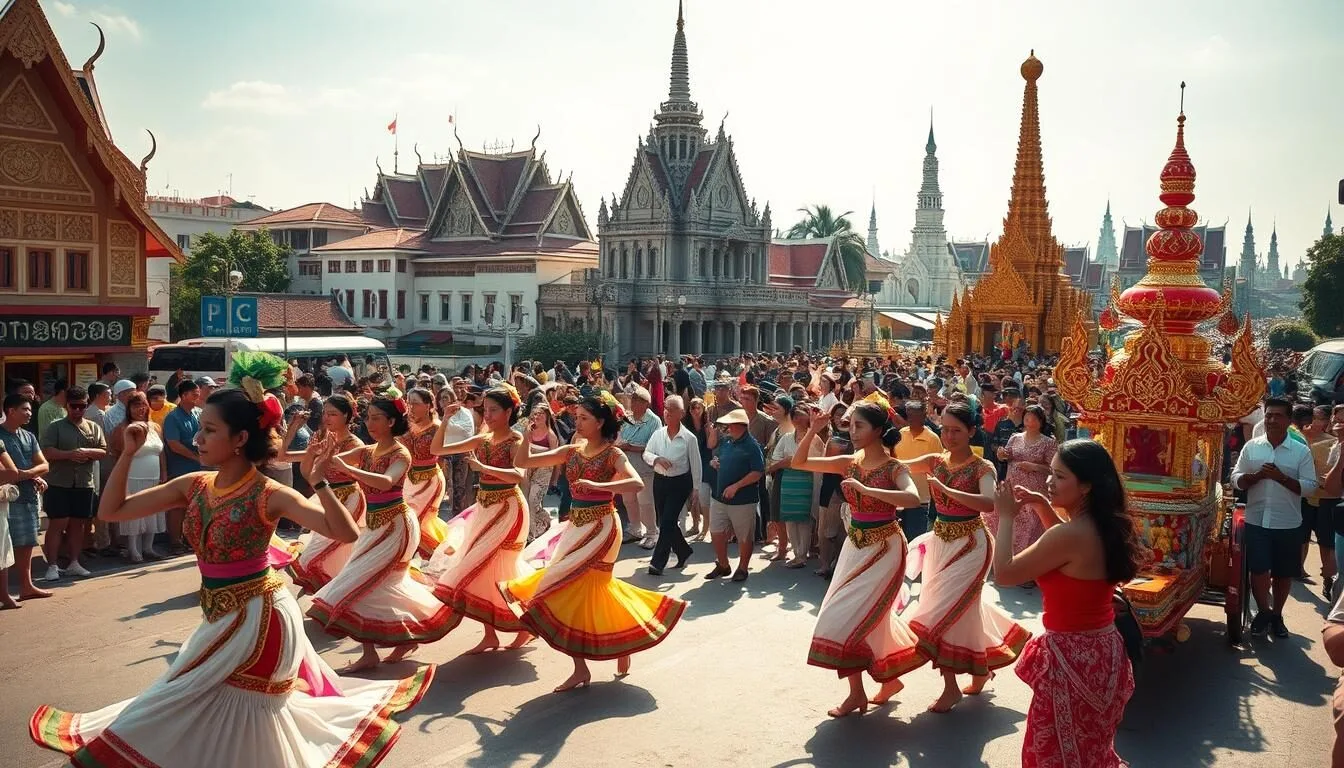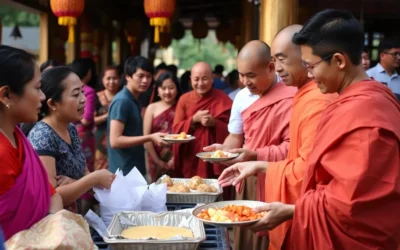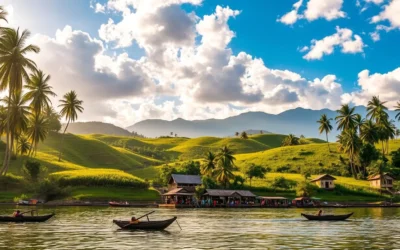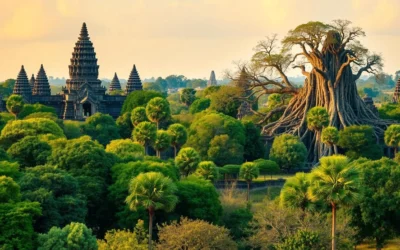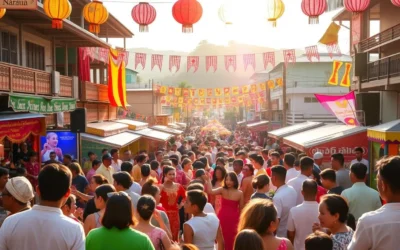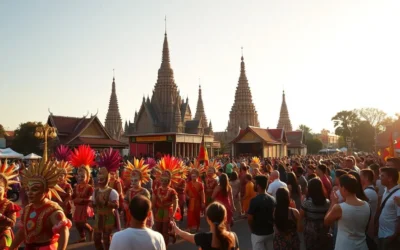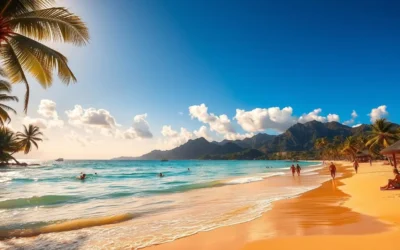✓ Accommodations✓ Flights✓ Rental Cars✓ Tours & Activities
When traveling to Cambodia, you’re not just visiting a country; you’re immersing yourself in a rich cultural heritage. The festivals in Phnom Penh are a testament to the nation’s deep-rooted traditions and celebrations that bring people together.
These events are a vibrant display of culture and community, offering a unique experience for travelers. As you explore the festivals in Phnom Penh, you’ll gain a deeper understanding of Cambodia’s history, values, and traditions that shape its unique cultural identity.
From joyous celebrations to solemn observances, each festival provides a different perspective on Cambodian life and spirituality. This guide will introduce you to the most significant festivals in Phnom Penh, helping you plan your visit to coincide with these cultural highlights.
Understanding Cambodia’s Cultural Heritage Through Festivals
The vibrant festivals in Cambodia offer a unique glimpse into the nation’s complex cultural landscape. These events are not just celebrations; they reflect Cambodia’s rich and varied cultural history, drawing inspiration from Buddhism, Hinduism, and old royal customs.
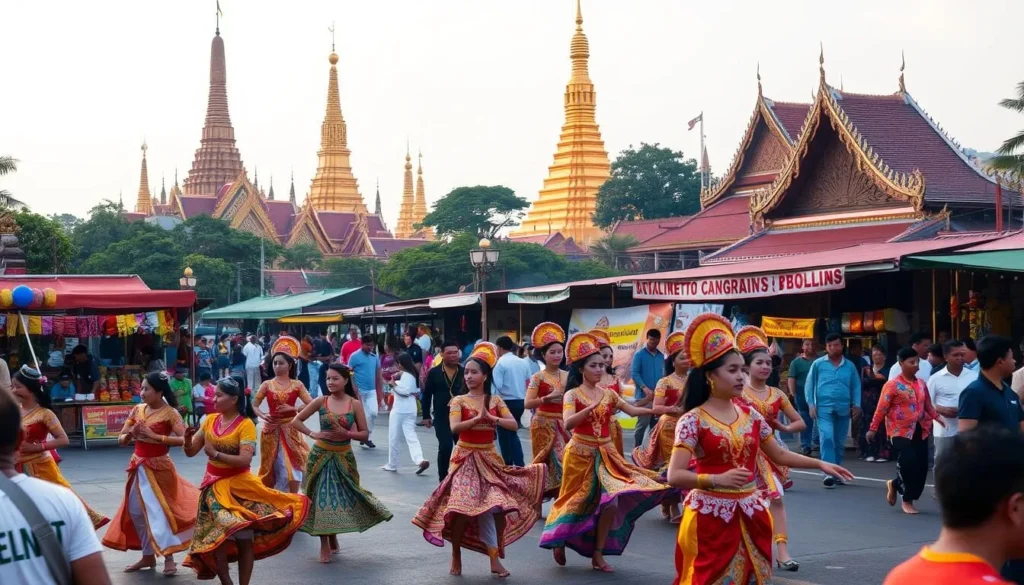
The Significance of Festivals in Cambodian Culture
Festivals serve as the backbone of Cambodia’s cultural expression, preserving traditions that date back to the Angkor period. They demonstrate the intricate relationship between daily life, spiritual beliefs, and historical events in Cambodian society. By participating in these festivals, you’ll gain insight into how they strengthen community bonds among Cambodians and serve as living museums of cultural heritage.
How Festivals Reflect Cambodia’s Religious and Historical Identity
The lunar calendar system determines the dates of these festivals, creating a unique rhythm to Cambodia’s cultural year. You’ll discover how these celebrations offer a window into Cambodia’s complex religious landscape, where Buddhism, animism, and ancient royal customs blend together. The religious and historical identity of Cambodia is vividly expressed through festival rituals, costumes, music, and food that you’ll experience during your Cambodia travel.
By understanding the significance of these festivals, you’ll appreciate how they have survived through centuries of change, including periods of political upheaval, demonstrating their importance to Cambodian identity. Visiting temples and participating in festival Cambodia events will enrich your travel experience.
Khmer New Year: Cambodia’s Most Celebrated Festival
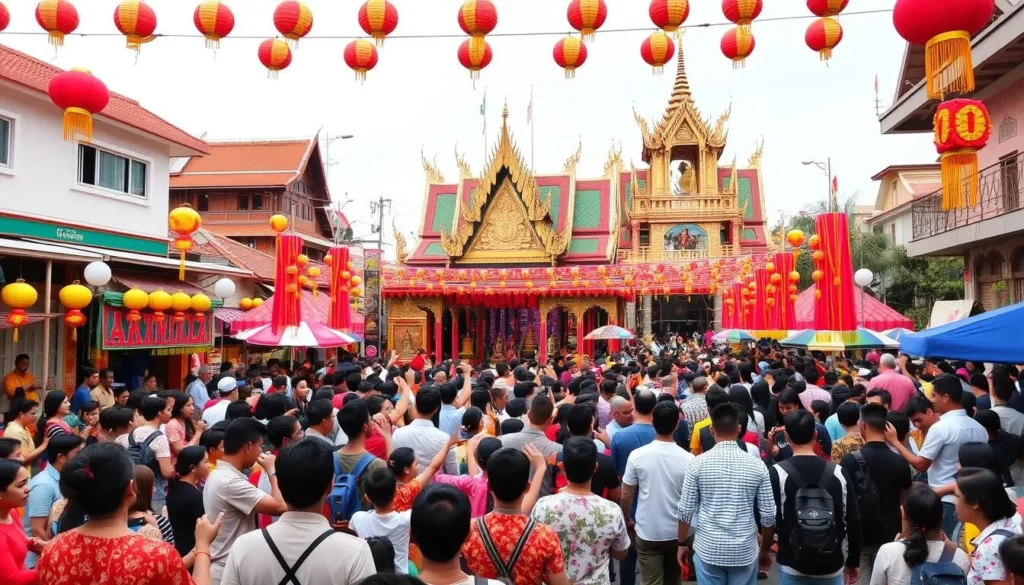
Experience the joy and renewal of Khmer New Year, Cambodia’s most significant festival, celebrated with fervor in Phnom Penh. This three-day celebration, typically taking place from April 13-15 every year, is a time for relaxation, family reunions, and cultural and religious festivities.
Traditional Activities During Khmer New Year
During Khmer New Year, Cambodians engage in various traditional activities, including cleaning their homes to sweep away bad luck and prepare for blessings in the coming year. You can participate in traditional games like Bos Angkunh (tug-of-war) and Chol Chhoung (ball-throwing) that are played throughout the city.
Best Places to Experience Khmer New Year in Phnom Penh
The best places to experience Khmer New Year in Phnom Penh include Wat Phnom, the Royal Palace area, and various public parks where cultural performances take place. You can witness special ceremonies at temples where Cambodians make elaborate offerings and receive blessings from monks for the coming year.
Water plays a significant role in the celebrations, symbolizing purification and the washing away of past sins and bad luck. Be prepared to get splashed and join in the fun as you immerse yourself in the festive atmosphere.
Water Festival: Celebrating Cambodia’s Unique River Phenomenon
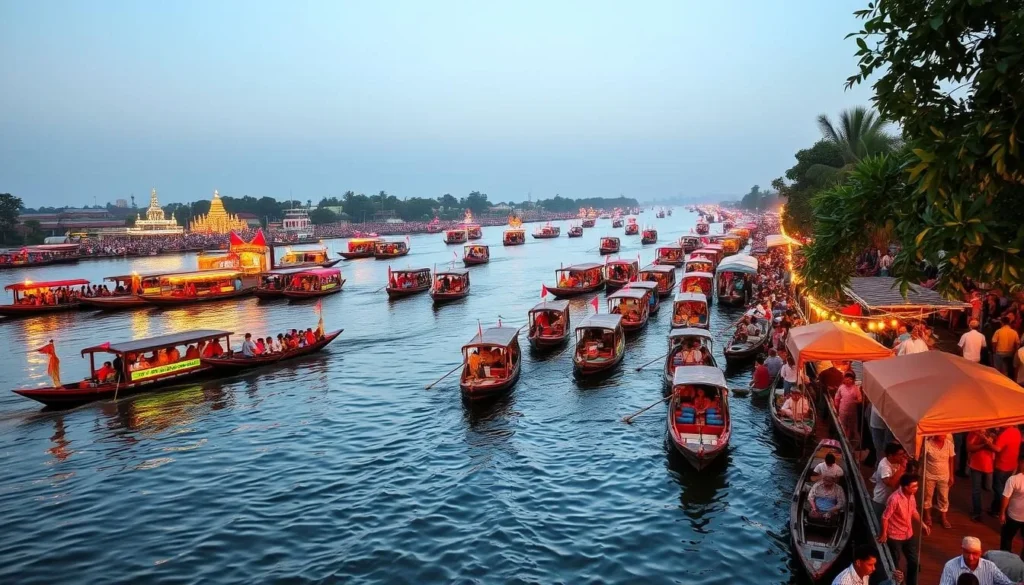
Every November, Phnom Penh hosts the Water Festival, a vibrant celebration of Cambodia’s rich cultural heritage. The Water Festival, also known as Bon Om Touk, is an annual event that commemorates the reversal of the flow between the Mekong and Tonle Sap rivers, a unique natural phenomenon.
This event is not only a celebration but also a way for Cambodians to thank the water god for abundant water and pray for the next harvest. The Water Festival features spectacular boat races, with teams competing on the Tonle Sap River. These races have ancient traditions, originally serving as naval battle training, now representing regional pride and community spirit.
Boat Racing Traditions and Their Cultural Significance
The boat racing competitions during the Water Festival are a thrilling spectacle, featuring hundreds of colorful longboats with up to 80 rowers each, representing different villages and provinces. The festival has deep historical significance, as the boat races originally served as naval battle training during the Angkor period.
The boat racing tradition is a vital part of Cambodian culture, symbolizing regional pride and community spirit. The races are not only entertaining but also a way to honor the country’s rich history and cultural heritage.
Experiencing the Water Festival as a Visitor
As a visitor, you can enjoy the festivities from the riverbanks in Phnom Penh, where thousands of Cambodians gather to cheer for their teams. The evening celebrations include illuminated boat processions, fireworks displays, and traditional music performances, creating a carnival atmosphere.
To make the most of your visit, arrive early to secure good viewing spots along Sisowath Quay, bring water and sun protection, and be prepared for large crowds during this popular event. By doing so, you’ll be able to fully immerse yourself in the vibrant culture and traditions of Cambodia.
Pchum Ben: Cambodia’s Festival of the Dead
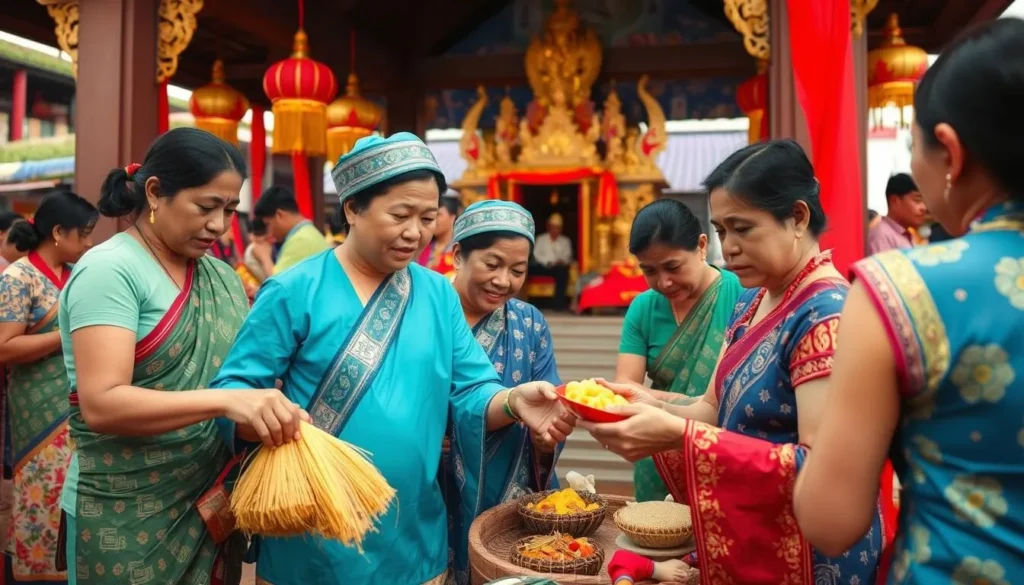
Cambodia’s Pchum Ben festival is a solemn occasion that offers a unique glimpse into the country’s spiritual practices. This 15-day festival, culminating on the 15th day of the 10th Khmer month, is a time for Cambodians to honor their ancestors. During Pchum Ben, families gather together and visit temples and pagodas to pay their respects and offer food to monks.
Rituals and Offerings During Pchum Ben
The preparation of special rice balls, known as “bay ben,” is a crucial ritual during Pchum Ben. These offerings are believed to benefit wandering spirits who cannot find peace in the afterlife. The food offered, particularly the bay ben, is believed to be passed on to the spirits, alleviating their suffering and reducing the sins of the ancestors. On the day of Bonn Pchum Ben, families make offerings to their ancestors, and celebrations take place in temples on the day itself.
Visitor’s Guide to Respectfully Observing Pchum Ben
As a respectful visitor, you should dress modestly when visiting temples during this period. Removing shoes before entering temple buildings and maintaining a quiet, respectful demeanor are essential. This festival provides you with unique insights into Cambodian spiritual beliefs and the deep respect for family lineage that characterizes Khmer culture. When traveling to Cambodia during Pchum Ben, you’re experiencing a significant aspect of Cambodia travel, immersing yourself in local customs and traditions.
Royal Ploughing Ceremony: Ancient Agricultural Traditions
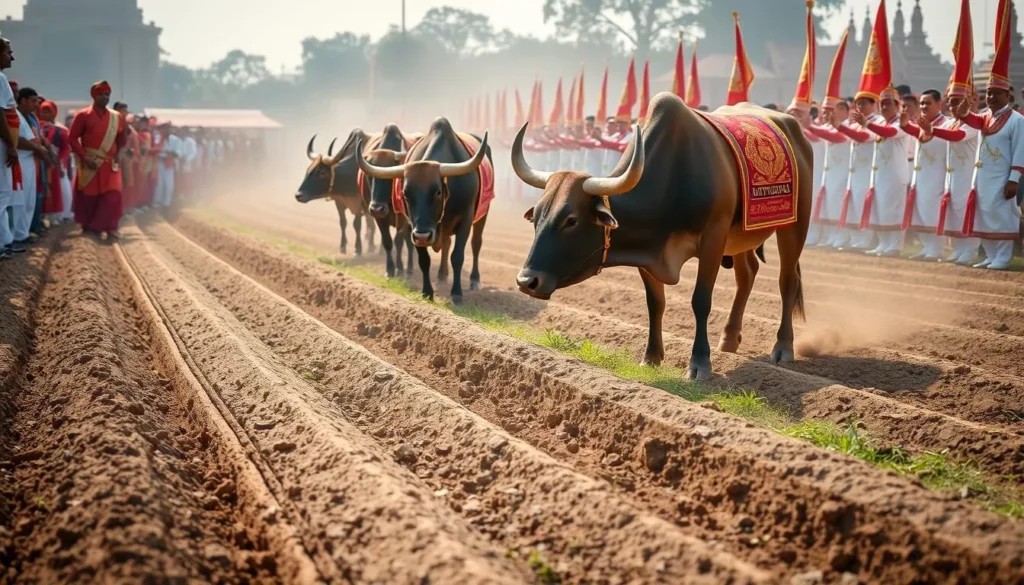
Marking the beginning of the rice planting season, the Royal Ploughing Ceremony is an event you won’t want to miss in Phnom Penh. Held typically in May at Lean Preah Sre park, this ancient ceremony combines elements of animism, Buddhism, and royal tradition in a fascinating cultural display.
Agricultural Predictions
The ceremony’s highlight is the agricultural prediction ritual, where Royal Bulls are presented with various foods including rice, grain, grass, water, and wine. The Bulls’ choices are interpreted as predictions for the coming agricultural year: rice or grain selections indicate good harvests, water signifies adequate rainfall, grass warns of insect problems, and wine predicts drought.
Historical Significance and Modern Celebrations
The Royal Ploughing Ceremony represents the deep connection between the Cambodian monarchy, agriculture, and spiritual beliefs that have persisted for centuries. As a visitor, you’ll have the opportunity to see members of the royal family and government officials participating in this important cultural event, offering insights into Cambodia’s agricultural heritage and traditional practices that still influence modern life.
Buddhist Celebrations in Phnom Penh, Cambodia: Top Festivals to Check Out When Visiting
When visiting Phnom Penh, Cambodia, you’ll have the opportunity to experience the city’s rich Buddhist heritage through its vibrant festivals. Two significant Buddhist celebrations take place in Phnom Penh every year, offering a unique glimpse into the city’s spiritual side.
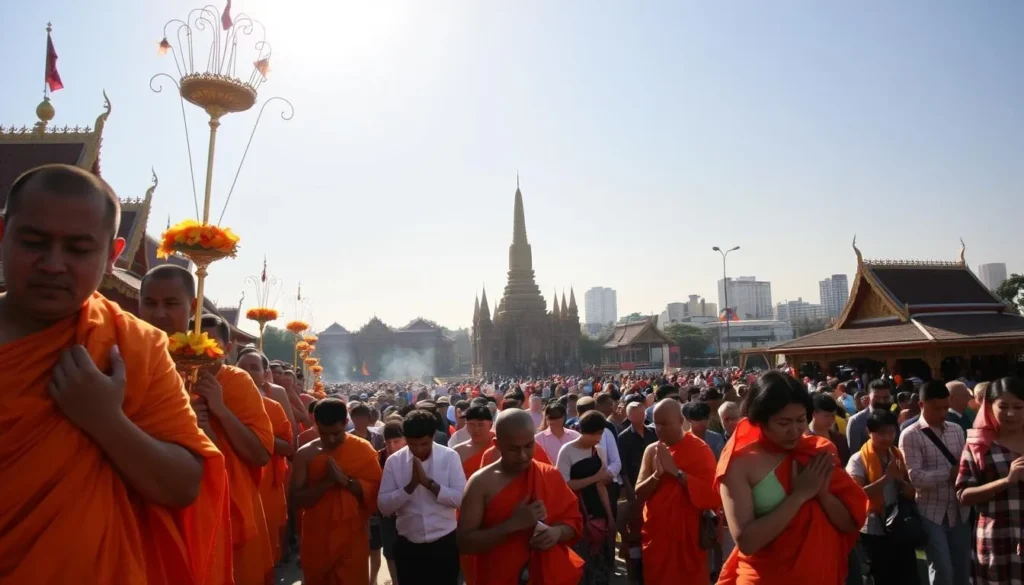
Vesak Bochea: Celebrating Buddha’s Life
Vesak Bochea, celebrated on the full moon day of the sixth lunar month, commemorates three significant events in Lord Buddha’s life: his birth, enlightenment, and passing into nirvana. During this day, you’ll witness devotees circling temples three times, holding candles, incense, and flowers, symbolizing the Three Jewels of Buddhism. Cambodian Buddhists make special offerings to monks and perform acts of charity, believing that good deeds done on Vesak Bochea bring special merit.
- Experience the spiritual dimension of Cambodian culture through Vesak Bochea celebrations.
- Witness devotees participating in candlelight processions around temples.
- Visit Phnom Penh’s most beautiful temples, including Wat Phnom and the Silver Pagoda, when they’re decorated and filled with worshippers.
Meak Bochea: Honoring Buddhist Teachings
Meak Bochea, held on the full moon day of the third lunar month, commemorates the spontaneous gathering of 1,250 enlightened disciples to hear Buddha’s teachings. On this day, monks lead meditation sessions and dharma talks, while devotees participate in candlelight processions around temples. You’ll observe how Cambodians reverence the Lord Buddha and the Triple Gem of Buddhism through their offerings and rituals.
- Discover the significance of Meak Bochea in Cambodian Buddhist culture.
- Participate in or observe the candlelight processions and meditation sessions.
- Learn about the importance of dressing modestly and respecting local customs during the festivals.
Tips for Attending Cambodian Festivals as a Visitor
When visiting Cambodia, attending its vibrant festivals can be a highlight of your trip, offering a unique glimpse into the country’s rich cultural heritage. To make the most of your experience, it’s essential to be aware of certain guidelines.
Cultural Etiquette During Religious Festivals
When attending religious festivals in Phnom Penh, dress modestly by covering your shoulders and knees, and remove your shoes before entering temple buildings. Be mindful of your behavior around monks and avoid pointing your feet toward Buddha images. By showing respect for local customs, you’ll have a more meaningful experience.
Planning Your Visit Around Festival Dates
Plan your trip carefully, as many Cambodian festivals follow the lunar calendar and dates change every year. Book your accommodations in Phnom Penh well in advance, as hotels fill up quickly during major festivals like the Water Festival. Be prepared for large crowds and take necessary precautions to stay safe.
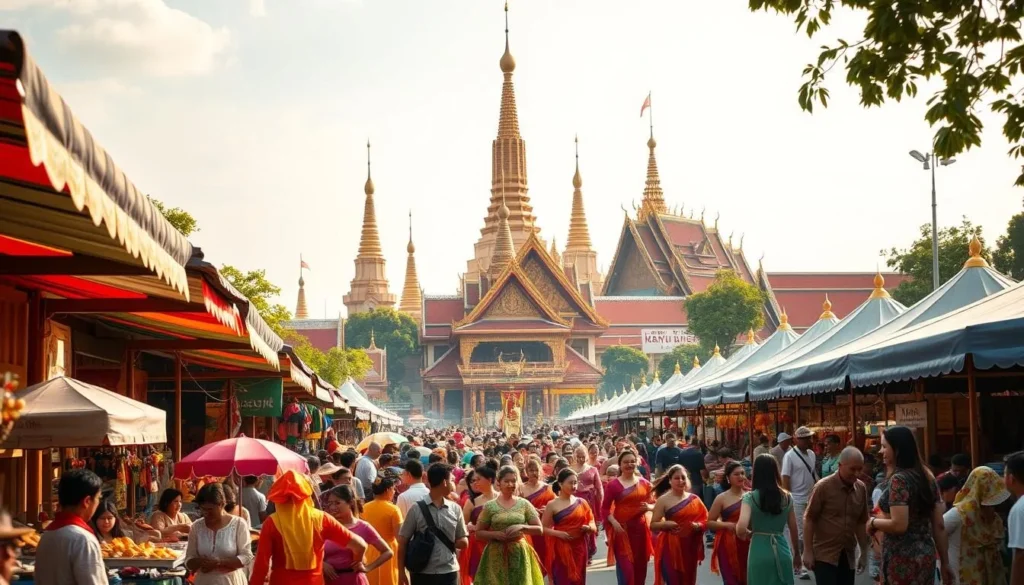
Conclusion
As you plan your Cambodia travel itinerary, consider timing your visit to coincide with one of Phnom Penh’s vibrant festivals. These events offer a unique window into the country’s rich cultural heritage and spiritual practices, providing a profound cultural immersion experience for travelers. From the joyous celebrations of Khmer New Year to the solemn observances of Pchum Ben, each festival reveals different aspects of Cambodian identity.
By experiencing these festivals in Phnom Penh, you’ll connect with the locals on a deeper level and witness the city’s vibrant culture every year. The calendar of events is filled with spectacular displays, such as the fireworks during the Water Festival, making your trip a truly memorable Cambodian experience.
The above is subject to change.
Check back often to TRAVEL.COM for the latest travel tips and deals.
